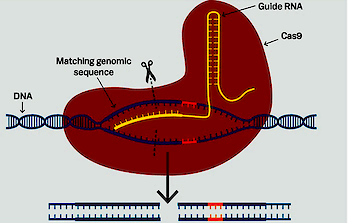Fast, accurate and accessible testing is important in dealing with tracking and halting the spread of coronavirus COVID-19. We have reached a milestone in this aspect with the approval of Drug Controller General of India (DCGI) for the commercial launch of India's first Clustered Regularly Interspaced Short Palindromic Repeats (CRISPR) coronavirus test 'Feluda' (FNCAS9 Editor-Limited Uniform Detection Assay), developed by the Tata Group and CSIR-IGIB (Institute of Genomics and Integrative Biology).
What is CRISPR?
CRISPR (clustered regularly interspaced palindromic repeats) is a defense mechanism, present in bacteria, which confers immunity against phages (Viruses infecting bacteria). Bacteria has evolved many different types of protection against infection by phages. One such defense mechanism is CRISPR. CRISPR consist of repeating palindromic sequences (A palindromic sequence is a nucleic acid sequence in a double-stranded DNA or RNA molecule wherein reading in a certain direction (e.g. 5' to 3') on one strand matches the sequence reading in the same direction (e.g. 5' to 3') on the complementary strand) of genetic code, interrupted by “spacer” DNA sequences – derived from DNA of phages which has previously infected the bacteria. (See Fig1).

Figure 1
What is CAS9? Cas9 protein (CRISPR Associated Protein 9) is an endonuclease (Cuts DNA) that can be used for the site-specific cleavage of double stranded DNA. It is guided by an RNA to the target DNA.
Figure 2
How does it work in bacteria?
CRISPR “spacer” sequences (which matches to the DNA sequence of phage) are transcribed into short RNA sequences (guide RNA) capable of guiding the system to matching sequences of viral DNA. When the target DNA is found, Cas9 – one of the enzymes produced by the CRISPR system (Fig.2 and 3) – binds to the DNA and cuts it.

Figure 3
How it is used for detection of corona virus infection?
The guide RNA is designed in such a way that it matches sequence of SARS-COV-2 virus (covid 19 virus). Cas9 protein is adapted in such a way that when CRISPR-Cas9 complex is bound to the viral sequence it gives rise to colour when paper strip is inserted in the mix.
Basically, the testing is of following steps.
1. Nasal and throat swab collected
2. RNA extracted.
3. RNA converted to c-DNA (Complementary DNA) by using PCR
4. Incubated in a mix of chemicals which contain CRISPR-CAS9 complex so that it can bind to the sequence of Covid 19 causing virus and Cleave the sequence.
5. Dip the paper strip in this mixture and identify colour change.
6. The paper strip generates the test result in the form of two lines for a positive and one line for a negative.

How is the Feluda test different than the rRT-PCR test?
The Feluda-CRISPR test neither require the machinery required for a RT-PCR nor the skilled manpower. Standard PCR machines can be used for the CRISPR test and it is more readily and widely available in labs. It takes lesser time than the rRT-PCR. This testing could also help reduce costs of testing — the real-time polymerase chain reaction test (RT-PCR) which is currently used costs Rs 4,500 in private labs. This ‘Feluda’ test could cost just about Rs 500.
As per the Ministry of Science and Technology, the test kit had a 96% sensitivity and 98% specificity to detect the SARS-CoV-2 virus. Sensitivity relates to the rate at which it can correctly detect positive cases (true positive rate) and specificity is the rate at which it can correctly detect negative cases (true negative rate).
Now this breakthrough we have achieved in diagnosing Covid 19 is definitely going to pave way for us in driving our future research to use CRISPR in diagnosing several other diseases even cancer.







